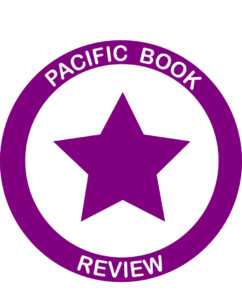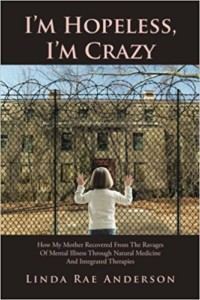Title: I’m Hopeless, I’m Crazy
Author: Linda Rae Anderson
Publisher: Xlibris
ISBN: 978-1524554545
Genre: Non-Fiction, Memoir, Self-Help, Mental Health
Pages: 152
Reviewed by: Barbara Bamberger Scott
Pacific Book Review Star
Awarded to Books of Excellent Merit

Raised in a dysfunctional family, writer and health practitioner Linda Rae Anderson had to heal herself, and then started the arduous but rewarding task of rehabilitating her “hopeless, crazy” mother Elaine, undoing years of misdiagnosis and negative patterning.
Elaine, born in 1916, had a twin sister, Eleanor, with whom she was very close as a child. But when Eleanor married, Elaine felt abandoned and immediately made a poor choice of a husband for herself, resulting in the author and her siblings experiencing a chaotic childhood. Her mother was often “away” in unexplained absences that Anderson later learned involved institutionalization for a diagnosis of schizophrenia. The primary treatment at the time was ECT (electro-convulsive, or “shock” therapy), still utilized for such patients, though controversial, today.
Anderson and her brother were often solely in charge of their lives as teenagers, with no social services intervention since their father was still around, sometimes. Once he got angry with his daughter and had her consigned to a juvenile criminal facility. From there, every step out was a step up as the author sought to change her life. Like her mother, she made a hasty bad choice of a spouse and wound up as a single mom struggling to get by. At the same time, she felt deep responsibility for her mother, who had gradually become a crawling, drooling, sedative-addicted victim of a seemingly uncaring health system.
Anderson’s parallel stories concern her mother’s experiences as well as her own search for healing, both of which led her to pursue a healthy diet and naturopathic remedies including herbal medicines, aromatherapy, and acupuncture. She was determined to get her mother away from the medical program that mandated ECT and heavily addictive sedation. Whenever Elaine would complain to her daughter that, “It’s not that simple,” Anderson would counter, “It is simple, but it isn’t easy.” Though it took some years of constant effort, combatting her mother’s desperate wish to go back to the safety of institutions and medications, she was successful. Elaine finally emerged as a happier, better functioning person, able to live on her own and interact with people as a volunteer and as a friend. With daily visits, meal preparation, written reminders posted to bolster her mother’s confidence and the assistance of a reliable vocational therapist, Anderson helped Elaine reconnect with her twin sister, her children, and her Jewish religious heritage.
Not an easy book to read for anyone who has experienced some of what Anderson has gone through, this is nonetheless a highly encouraging manual for those facing similar challenges, since the end result was, for Elaine, highly positive. The author cites recent changes in the mental health network in the state of OR. as a hopeful sign for others. She notes that though Elaine was diagnosed with mental illness at any early stage of life, she enjoyed fifteen years entirely free of all symptoms.
A combination memoir and practical manual for healing, I’m Hopeless, I’m Crazy recounts a journey taken by a daughter and her mother towards genuine hope and restored sanity.


